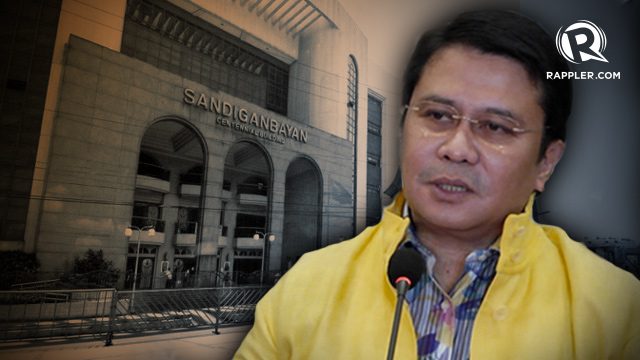SUMMARY
This is AI generated summarization, which may have errors. For context, always refer to the full article.

MANILA, Philippines – Why distinguish between the pork barrel scam case and other plunder and graft cases pending before the anti-graft court?
This was the argument of Senator Jinggoy Estrada in a comment he filed before the Supreme Court opposing the Ombudsman’s request for the creation of at least 2 special divisions to exclusively try the pork barrel scam case.
Estrada’s legal team headed by veteran criminal trial lawyer Jose Flaminiano reiterated his argument that creating special divisions shows that the administration is targeting the opposition.
The senator’s lawyers said that the Ombudsman’s request “raises equal protection and due process concerns.”
“The equal protection of the laws is a guarantee against any form of undue favoritism or hostility from the government. It is embraced under the due process concept and simply requires that, in the application of the law, ‘all persons or things similarly situated should be treated alike, both as to rights conferred and responsibilities imposed,’” Estrada’s lawyers said in the comment filed on June 16.
Watch this report below.
Estrada’s lawyers added that creating special divisions with hand-picked members might violate his right to due process.
“It departs from established rules, procedure, and practice of the Sandiganbayan, and deprives Senator Estrada of the procedural protection of a raffle of the cases among existing Divisions which excludes deliberate choice of who will sit in judgment in the cases against him.”
On June 6, Ombudsman Conchita Carpio Morales requested the high court to create at least two special divisions in the Sandiganbayan to try the country’s biggest corruption scandal in recent history. She argued that “the complexity of the issues involved, the number of accused” merit the formation of special divisions.
Yet Estrada’s lawyers said that the “national magnitude of these cases” and the “far-reaching consequences” that the Ombudsman cited are not compelling reasons for the request.
“The existing Divisions are well-equipped to hear, try and decide the [pork barrel] cases regardless of their magnitude, complexity and far-reaching consequences. To be sure, the Sandiganbayan is already a ‘special court’ with a limited and specialized jurisdiction. Clearly, there is no further need to create a special division just to try the PDAF cases.”
Estrada’s position echoes that of the Sandiganbayan, which told the Supreme Court that there is no need for special divisions, and creating these could “conflict with other equally important cases” the court is handling.
The release of the comment comes 3 days after Estrada was arrested for plunder and 11 counts of graft. He, Revilla, and Enrile are accused of channeling their discretionary funds known as pork barrel to bogus non-governmental organizations of scam mastermind Janet Lim Napoles in exchange for millions of pesos in kickbacks.
‘Erap case not applicable’
Estrada added that at the onset, the Ombudsman should have addressed its request to the Sandiganbayan en banc, which can ask the Supreme Court to create special divisions.
He cited the plunder case of his father, former President and now Manila Mayor Joseph Estrada, where the Supreme Court granted the elder Estrada’s request for the creation of a special court.
Senator Estrada said that the ruling in his father’s case is different and inapplicable to his because the court then found that 5 justices of the Sandiganbayan were retiring within 5 months, 3 expressed their preference not to be assigned to the special division because of their close relationship with the accused, one was an appointee of the accused, and another was “a very recent appointee.”
“The ‘facts and all attendance circumstances’ [in the ruling] are not present in the PDAF cases against Senator Estrada,” his lawyers said.
Before his arrest, Senator Estrada already strongly opposed the Ombudsman’s request, saying that all special divisions including that which tried his father’s case were “designed to convict the accused.”
In a privilege speech on June 11, Estrada also rejected the proposal as a “a very, very lame excuse for such an obvious attempt to hand-pick the men and women who are disposed to convict us.”
“I am very sure that what the Ombudsman really wants is not speedy trial but a speedy convicting court,” he said. – Rappler.com
Add a comment
How does this make you feel?
There are no comments yet. Add your comment to start the conversation.